九年级英语REVISION UNIT4
九年级英语 Unit 4 What would you do教案 人教新课标版
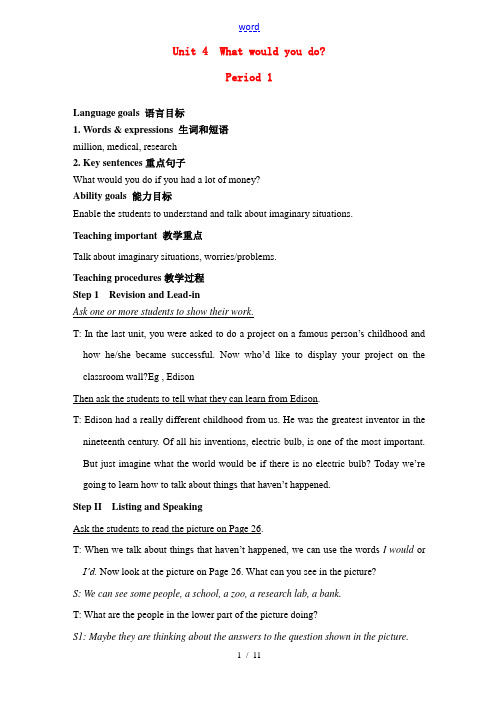
Unit 4 What would you do?Period 1Language goals 语言目标1. Words & expressions 生词和短语million, medical, research2. Key sentences重点句子What would you do if you had a lot of money?Ability goals 能力目标Enable the students to understand and talk about imaginary situations.Teaching important 教学重点Talk about imaginary situations, worries/problems.Teaching procedures教学过程Step 1 Revision and Lead-inAsk one or more students to show their work.T: In the last unit, you were asked to do a project on a famous person’s childhood and how he/she became successful. Now who’d like to display your project on the classroom wall?Eg , EdisonThen ask the students to tell what they can learn from Edison.T: Edison had a really different childhood from us. He was the greatest inventor in the nineteenth century. Of all his inventions, electric bulb, is one of the most important. But just imagine what the world would be if there is no electric bulb? Today we’re going to learn how to talk about things that haven’t happened.Step II Listing and SpeakingAsk the students to read the picture on Page 26.T: When we talk about things that haven’t happened, we can use the words I would or I’d. Now look at the picture on Page 26. What can you see in the picture?S: We can see some people, a school, a zoo, a research lab, a bank.T: What are the people in the lower part of the picture doing?S1: Maybe they are thinking about the answers to the question shown in the picture.S2: The woman is reading a newspaper and they are all thinking of the answers to the question.T: Pretend you are the people in the picture, what would you do if you had a million dollars?S3: I’d buy a beautiful car.Write buy a beautiful car on the blackboard.S4: I’d build a research lab.S5: I’d give it to the H ope Project.S6: I’d travel around the world.S7: I’d give it to medical research.Ask for more ideas from the students. Write their ideas on the blackboard.buy a beautiful car,travel around the world, give it to the Hope Project, build a school for the poor children, build a library for our school, build a research lab Show the following to the students and then ask them to practice in pairs.-What would you do if you have a million dollars?-I would (I’d) ____________.T: Now work in pairs and make dialogues.Sample dialogues:1.– What would you do if you saw someone stealing something?–I’d call the police.2.– What would you do if you lost your bike?–I’d buy a new one.3.– What would you do if you saw a girl crying in the street.–I’d help her find h er mother.4.– What would you do if the teacher asked you to sing a song to the class?–I’d say yes.Step III ListeningAsk the students to listen to the recording and pare their answers with those in therecording.T: Next we’ll hear a conversation abou t how to spend a million dollars. The recording will be played twice. For the first time, listen to get the order you hear.Play the tape for the first time.T: For the second time, please number the picture in the order you hear them.Play the tape for the second time. Then check the answers.Step IV Homework1.Ask the students to do more practice as required in 1c on Page 26.2.Ask the students to prepare for the next period: Think about if you have any worriesor problems in daily life.Unit 4 What would you do?Period 2Language goals 语言目标1. Words & expressions 生词和短语tie, worry, what if, pimple2. Key sentences重点句子If I were you, I’d take a small present.Ability goals 能力目标Enable the students to deal with problems and worries.Teaching important 教学重点Talk about problems /worries.Teaching procedures教学过程Step 1 Revision and Lead-inAsk the students to share their ideas about what their worries are first, and then listen to the recording talking about worries.Step 2 Listening Practice (2a, 2b , 2c)Ask the students to listen to the dialogue about Larry’s worries.Play the recording for the first time. Choose the reasons why Larry is nervous? Check the answers, then play the recording for the second time. Check the four things Larry’s sister says to him .( 1, 2, 4, 5)Step 3 PairworkIf you were Larry, what would you do? Make dialogues in pairs.Sample conversation:A: What would you do if you were Larry?B: If I were Larry, I would bring a birthday cake.Step 4 Grammar focus虚拟语气:如果我们所说的不是事实,也不是要求、命令、劝告等,而只是一种假设、愿望、建议或是一种实现不了的空想就用虚拟语气。
牛津译林版英语9B 九年级下册Unit4RevisionI课件
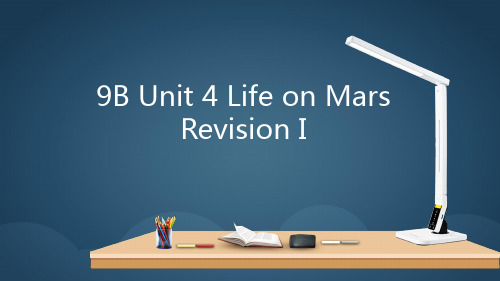
Barney: In my opinion , there is no life on Mars. You know, the environment there is not suitable for life at all. How can people __l_iv_e__o_n_M__a_r_s____ if there is no oxygen?
travel into space dried food sleeping bag
(all) over again in the form of
compare to/ with at a/ the speed of by the year 2100
随着技术的发展 人口的快速增长 感到不舒服 大量旅客 飘离到太空中 (使)连接; 联接 因为低重力 住在火星上
wouldn't have to go to school. An interplanetary network would allow them to study at online
schools.
完成句子 1. 欢迎以钱的形式资助。
_H_e_l_p_i_n_t_h_e__fo_r_m__o_f_m__o_n_e_y____ will be welcome. 2. 据说大批的游客在五一假期去了西藏。
Teaching aims: 1. To review words and important phrases on the topic ; 2. To review grammar in this unit; 3. To do some exercises.
Key WLeabharlann rds1. 行星 n.planet
_C_o_m__p_a_r_e_d_w__it_h_t_h_e__li_fe__o_n_t_h_e_E_a_r_t_h___, life on Mars would be better in some ways. 5. 由于人口急剧增长,我们的城市变得越发拥挤,污染日益严重。
人教版九年级英语 Unit 4 Section A(1a~2d) 精品课件

Now Appearance
3. What do you think of her?/ What is she like?
She is nice, friendly, active, ...
Look and talk
A: Did Mario use to be short? B: Yes, he did. He used to be really short. A: What’s he like now? B: He’s tall now.
Revision Pre-listening While-listening Post-listening Summary
Personality
Revision Pre-listening While-listening Post-listening
Summary
Brainstorm Can you think of more words or expressions about appearance and personality?
Appearance
Height tall, short, of medium height ...
Build heavy, slim, thin, of medium build ...
Other long straight hair, short curly hair, a round features face, big eyes, wear glasses ...
She used to have long straight hair, but now she has short straight hair.
人教版英语九年级全一册:Unit 4 Section A (1a-3c)教案
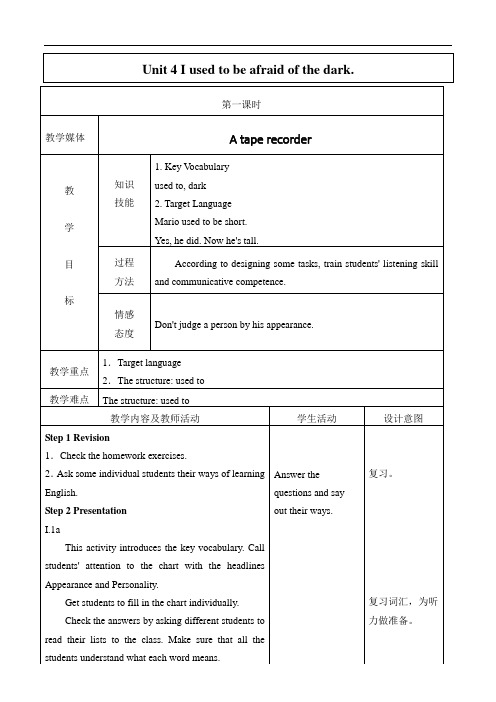
Step 2 presentation
I.2a
This activity provides listening practice using the
target language. Point to the picture and ask students Look at the
what is happening. Elicit answers from students.
Activities 2b and
2c. Then make
conversations
about
themselves.
板
Unit 4 I used to be afraid of the dark.
conversation.
Write two dates side by side on the blackboard.
The first is today's date, including the year, and the
second is the same day, but ten years ago.
Have students work in pairs. Move around the Read the room listening in on various pairs and offering help if conversation
将所学知识转化 为生活语言,便于 使用。
necessary.
several exchanges, ask pairs to come to the front of the in Activity 1b. Have 反复练习,把知
room and act out their conversations.
人教版英语九年级全一册unit4教案.docx

Unit 4I used to be afraid of the dark.一、教学目标:知识与技能: Knowledge and Ability Objects1.会写 , 会读 , 会用本节课的重点单词短语。
2. 熟练运用 used to do sth 谈论自己、他人过去的习惯、爱好、形象及经常做的事情。
过程与方法 : Method Objects in Teaching1.本课的生词和短语。
2. 通过听力练习,进一步掌握用 Used to do 谈论过去的喜好 3. 能够表达自己现在和过去在外表、性格、爱好等方面的变化。
通过阅读技巧的学习,让学生了解如何通过上下文猜测词意。
情感态度与价值观:培养学生克服困难,战胜自己的勇气,特别是如何用爱来感动学友。
二、教学重点:掌握 used to do句型三、教学难点:学会表达自己现在和过去在外表、性格、爱好等方面的变化四、教具准备: PPT录音机五、授课类型:新授课六、课时安排:本单元共 5 课时:Section A (1a— 2d)1 课时Section A( 3a—4c)1 课时Section B (1a— 1e)1 课时Section B (2a— 2f )1 课时Section B (3b-self check)1课时七、备课时间: 2015.9.22八、教学过程Section A (1a-2d)复备栏1.情景引学Step 1: Lead-inWe have been together for over two years. Do you remember whathe was like before? /in Grade One? What does he look like now?Compare two or three students or teachers. Let students tellsomething about their appearance or personality.Write “ He was short in Grade OneBut. he is tall now.”Today we learn a new sentences He used“ to be short. But heis tall now . ”2. 自主探学Step 2: explain “ usedto be/do ” “He used to play computergames every day. But now he study really hard.”Let students describe their partner. Please use“ used to do /be”Step 3: Deal with activity 1aTurn to p25, let’ s look1aat.Please write down the words as manyas possible. if you want to know others’ appearance or personality, we can ask:“ What does he look like?/ What’ s he like?”3.合作研学Now I want to know something about yourself. “ What’yourschange? ” Please use “ I used to ⋯I ,but⋯”nowFour students a group.4.变换拓学Step 4: Deal with 1b and 1c.Let ’looks at the picture. and could you tell us what are theirchanges?Listen to the tape and do 1bStep 5: deal with 2a and 2b.Listen to the tape and do 2a and 2b重点句型:1. I used to be afraid of the dark.我过去常常怕黑。
人教版九年级英语全册Unit 4 Section A 3a-3c课件
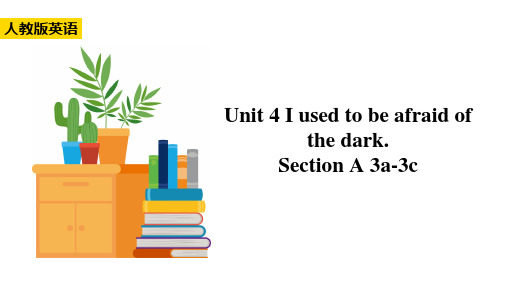
Job _i_n_te_r_v_i_e_w_s_ can be very different from country to country. 他采访了那位著名记者。 He gave an _i_n_t_e_r_v_ie_w__ to that famous journalist.
She used to be shy, but now she is outgoing.
RevPriessieontnationUse used to and now to describe the changes.
In the past
drink a lot
Now
She _u_s_e_d_t_o__ have short hair.
Scanning
Read Paragraph 1 and fill in the blanks
Asia n. 亚洲
Candy'sdBeaal cwkitghr处ou理n,应d 对(方法)
how to deal with it
NAsaimane:adnCj..亚亚an洲洲d(y人W)的a;ng. AAgegdw:eoh1:aw9tittyhoed处aor理ws,io应thld对(对.. 象)
As time goesHboycHbw,huewahtndanegivodeaewndlt'l?hthheueyasgeveettosctbhoenapsnoogpfeuadlt.aternintiosnch. ool.
She used to hang out with her friends. but now there are always guards around her.
人教版九年级英语 unit 4 写作课---How to create a composition教学课件 (共29张PPT)

Paragraph 1
In my childhood, I used to play games with my friends. And in the evening , I watched TV and chatted with my grandma.
early
9. 最好的(adi) ,最佳状态(n)
best
Revision(phrases)
1. 起床
get up
2. 睡觉 3. 做作业
go to bed do my homework
4. 有很多时间 have much time in doing
spend much time in doing
5. 看电视
watch TV
6. 考取好成绩 get the good score
7.让.......感到自豪 be proud of / take pride in
Revision (importances)
1. 过去常常
used to do
2. 过去不曾
didn't use to do
3.以便 4. 即使
Creativity takes courage.
( 创造需要勇气。)
1. I used to be a fat and heavy woman. 2.I didn’t used to chat with my friends. 3. I didn’t used to watch TV.
Where is my time?
Score (评分 )
10分
Translation
(3)现在我上初三了,很忙。每天我必须早起早睡, 没时间玩;
Unit4+SectionGrammar课件2024-2025学年人教版英语九年级全册

Used to 的反义疑问句
主语+used to do sth, didn’t +主语? used not+主语?
I used to be a teacher, didn’t you? used not you?
He used to watch a lot of TV, didn’t he? used not he?
4b Look at the information and write sentenቤተ መጻሕፍቲ ባይዱes about
Emily.
Five years ago
Now
didn’t eat a lot of vegetables loves carrots and tomatoes
listened to pop music watched scary movies didn’t read a lot of books
完成句子 11. 她过去常常很安静。
She ______u_s_e_____to_ _____b_e_ very quiet. 12. 我过去放学后常踢足球。
I _____u_s_e ____t_o__ ___p_l_a_y_ soccer after school.
句型转换 13. He used to take a walk in the park here. (改为否定句) He __d_i_d_n_’_ _t _u_s_e___ / __u_s_ed__n_’tot take a walk in the park here.
9.I used to go to school by bus.(对画线部分提问) _H_o_w__ __d__id___ you _u_s_e__ __t_o__ go to school? 10.They used to play basketball on the playground.(改为反意疑问句) They used to play basketball on the playground,d_i_d_n_'_t __ _t_h_e_y___ ?
九年级人教版 Unit4 Revision
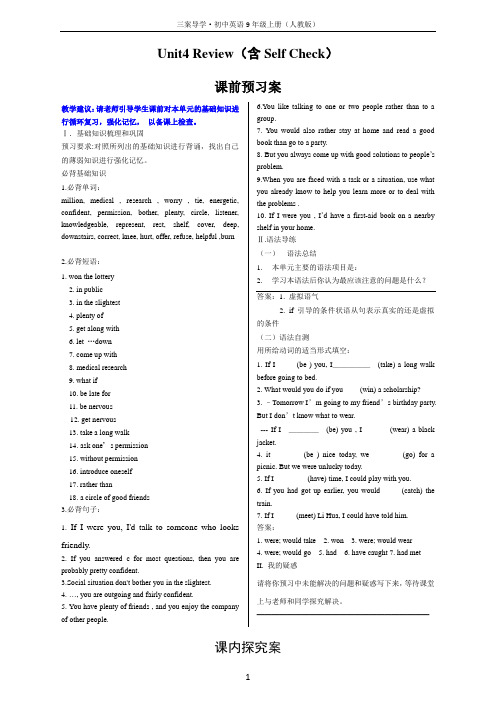
Unit4 Review(含Self Check)课前预习案教学建议:请老师引导学生课前对本单元的基础知识进行循环复习,强化记忆,以备课上检查。
Ⅰ.基础知识梳理和巩固预习要求:对照所列出的基础知识进行背诵,找出自己的薄弱知识进行强化记忆。
必背基础知识1.必背单词:million, medical , research , worry , tie, energetic, confident, permission, bother, plenty, circle, listener, knowledgeable, represent, rest, shelf, cover, deep, downstairs, correct, knee, hurt, offer, refuse, helpful ,burn2.必背短语:1. won the lottery2. in public3. in the slightest4. plenty of5. get along with6. let …down7. come up with8. medical research9. what if10. be late for11. be nervous12. get nervous13. take a long walk14. ask one’s permission15. without permission16. introduce oneself17. rather than18. a circle of good friends3.必背句子:1.If I were you, I'd talk to someone who looksfriendly.2. If you answered c for most questions, then you are probably pretty confident.3.Social situation don't bother you in the slightest.4. …, you are outgoing and fairly confident.5. Y ou have plenty of friends , and you enjoy the company of other people.6.Y ou like talking to one or two people rather than to a group.7. Y ou would also rather stay at home and read a good book than go to a party.8. But you always come up with good solutions to people’s problem.9.When you are faced with a task or a situation, use what you already know to help you learn more or to deal with the problems .10. If I were you , I’d have a first-aid book on a nearby shelf in your home.Ⅱ.语法导练(一)语法总结1.本单元主要的语法项目是:_________________2.学习本语法后你认为最应该注意的问题是什么?答案:1. 虚拟语气2. if 引导的条件状语从句表示真实的还是虚拟的条件(二)语法自测用所给动词的适当形式填空:1. If I _____(be ) you, I_____(take) a long walk before going to bed.2. What would you do if you ____(win) a scholarship?3. –Tomorrow I’m going to my friend’s birthday party. But I don’t know what to wear.--- If I____(be) you , I ______ (wear) a black jacket.4. it _______ (be ) nice today, we _______ (go) for a picnic. But we were unlucky today.5. If I ________ (have) time, I could play with you.6. If you had got up earlier, you would _____(catch) the train.7. If I _____ (meet) Li Hua, I could have told him.答案:1. were; would take2. won3. were; would wear4. were; would go5. had6. have caught7. had metII. 我的疑惑请将你预习中未能解决的问题和疑惑写下来,等待课堂上与老师和同学探究解决。
人教新目标英语九年级《Unit 4 I used to be afraid of the dark》Revision说课稿
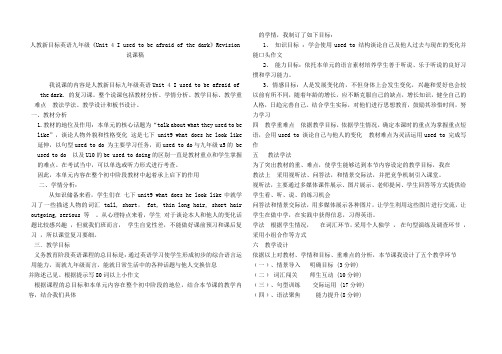
人教新目标英语九年级《Unit 4 I used to be afraid of the dark》Revision说课稿我说课的内容是人教新目标九年级英语Unit 4 I used to be afraid of the dark. 的复习课。
整个说课包括教材分析、学情分析、教学目标、教学重难点教法学法、教学设计和板书设计。
一、教材分析1.教材的地位及作用:本单元的核心话题为“talk about what they used to belike”,谈论人物外貌和性格变化这是七下unit9 what does he look like 延伸,以句型used to do 为主要学习任务,而used to do与九年级u5的 be used to do 以及U10的be used to doing的区别一直是教材重点和学生掌握的难点。
在考试当中,可以单选或听力形式进行考查。
因此,本单元内容在整个初中阶段教材中起着承上启下的作用二、学情分析:从知识储备来看,学生们在七下unit9 what does he look like中就学习了一些描述人物的词汇 tall, short, fat, thin long hair, short hair outgoing, serious 等。
从心理特点来看,学生对于谈论本人和他人的变化话题比较感兴趣,但就我们班而言,学生自觉性差,不能做好课前预习和课后复习,所以课堂复习要细。
三.教学目标义务教育阶段英语课程的总目标是:通过英语学习使学生形成初步的综合语言运用能力,而就九年级而言,能就日常生活中的各种话题与他人交换信息并陈述己见。
根据提示写80词以上小作文根据课程的总目标和本单元内容在整个初中阶段的地位,结合本节课的教学内容,结合我们具体的学情,我制订了如下目标:1、知识目标:学会使用used to 结构谈论自己及他人过去与现在的变化并能口头作文2、能力目标:依托本单元的语言素材培养学生善于听说、乐于听说的良好习惯和学习能力。
九年级英语unit4 I used to be afraid of the dark.教学设计

Unit 4 I used to be afraid of the dark.Section B 2a- 2e一.教学目标1.语言知识目标:1)掌握重点单词:influence ,seldom ,proud , be proud of , absent ,fail ,in person,pride2)掌握重点句子2.教学重难点:1)教学重点:掌握生词及语法。
阅读短文,获得相关信息,提高学生们的综合阅读能力。
2)教学难点:阅读短文并完成相关要求。
二.情感态度价值观目标:让学生明白事物是在不断发展、变化的道理,培养学生积极向上的心态。
三.教学过程1.Warming -up and revision1)Daily greeting.2)Check the homework.2.Lead in1)Show a picture of a young student .Tell Ss that the boy is Li Wen.He’s a 15-year-old boy whose parents are working in the city. Look at the title of the passage and predict the problems he might have.He Studies Harder Than He Used to2). Now discuss them with your partner and guess the problems he might have.3)Ask some students guess the problems.3.Reading (2b)Read the passage and put the sentences [A-D]in the correct places. Give some good ways to the Ss.Check the answers with the class.4.2cRead the passage again and try to underline the problems that Li Wen used to have.Check the answers with the Ss.5.2eStudents work by themselves. If they have some questions, they may go through the proper paragraphs in 2b again.Check the answers with the class.6.课堂练习根据括号内的汉语提示完成句子。
2014新人教版教材九年级英语第四单元全单元教案解析
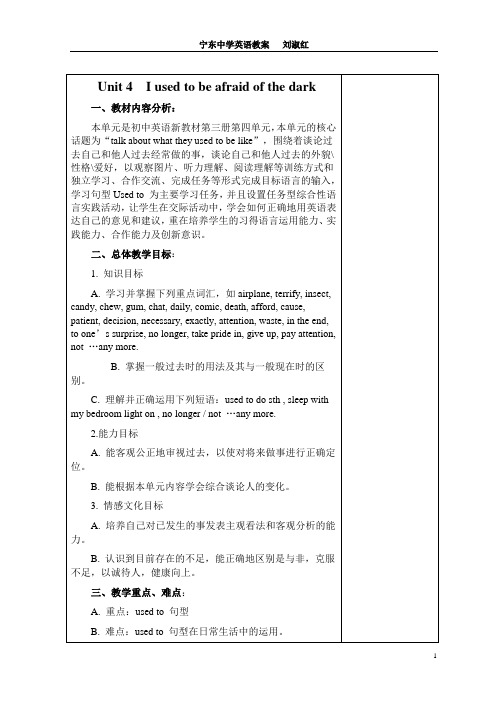
1.Understanding of the passages.2.Methods of expressing ways of studying different subjects.Ⅲ、学情分析本课时是第一单元第三课时。
本单元的话题非常接近学生的现实生活,谈论刚过去的生活是学生较喜欢、较乐于去交流的话题。
通过本单元的学习,引导学生学会使用讨论合作、信息采集、比较等学习策略。
Ⅳ、Teaching tools:1. A tape-recorder.2.Several flashcards.Ⅴ、Teaching methods:Help the students to use dictionaries in reading to deal with the new words and try to understand them according to the context.VI、Teaching process:Step 1 RevisionAsk some students how they study English ,get them to answer individually .Step 2 ReadingSB Page 4 , 3a .1. First ,ask one volunteer to read the article aloud to the class .2. Have students read through the passage one or two times and complete the chart on their own .3. Correct the answers .Step 3 PairworkSB Page 4 , 3b .1. Read the instructions to the class and ask a pair of students to practice the sample conversation .2. Then in pairs ,have students make their own conversation according to activity 3a .3. Ask some pairs to present their conversations .SB Page 4 , Part 4 .1. Ask students to check what they do to learn English in thechart .Then get them to work in pairs to interview their partner .2. Call some pairs to act out their dialogues in front of the class .Step 4 PracticeSB Page 5 , 1a & 1b .1. Ask one student to read the sentences to the class .2. Then have students check the statements which are true for them and ask them to add some other different things .3. Ask several students to write their lists on the blackboard and discuss them with the whole class .Step 5 ListeningSB Page 5 , 2a & 2b .1. Ask two students to read the challenges and solutions .Ifnecessary ,have students repeat after you .2. Play the recording two or three times ,let students listen and finish the work .3. Ask one student to have his/her answers with the class .4. Correct the answers .Step 6 PairworkSB Page 5 , 2c .In pairs ,students role play conversations using the information from activity 2a and 2b .Then ask some pairs to present their dialogue to the class .Step 7 HomeworkWrite an article to introduce how you study English.板书Unit 2 I used to be afraid of the dark设计:课后反思:Period 4教学内容: Section B 3a, 3b , 3c ,Ⅰ、教学目标知识目标: Make the students grasp the usage of “used to do sth.”能力目标: Help the students to describe a person using the materials offered.Teach the students to love studying and try to find the best and most suitable way.Ⅱ、教学重难点3.How to use verbs.4.Describing a person.Ⅲ、学情分析本课时Section B的3a是一篇中长文章内容主要是作者谈到他现在遇到的最在问题,同样也是以比较的形式来描述。
人教九年级英语 Unit 4 全单元教案设计

Exercise
I.写出下列各词的反义词:
1. thin2. short3. quiet
4. curly5. upset6. dull
II.完成下列句子
1. — Did you? — Yes, I used to be serious.
2. —do?
— No, she didn’t. She used to play the piane.
课堂练习
I.根据汉语提示填空,完成句子。
1. He has plenty of _________ (幽默的) stories to tell us.
2. You’d better keep _______ (沉默) about what happened.
课后作业
Recite the conversation in 1c after school.
Then learn the sentence.
I used to be afraid of big dogs.I’m still afraid of big dogs.
Step 4. Learn and Practice (3a)
1. Learn the words or phrases with the pictures , big dogs / snakes / high places / the dark / being alone / flying in an airplane / speaking in front of a group.
1. Ss do the survey to fill in the chart with the questions.
What did you use to eat? What do you eat now?…
新人教版教材九年级英语第四单元全单元教案解析

Step 1 Revision&Ask some students how they study English ,get them to answer individually .Step 2 ReadingSB Page 4 , 3a .1. First ,ask one volunteer to read the article aloud to the class .2. Have students read through the passage one or two times and complete the chart on their own .3. Correct the answers .Step 3 PairworkSB Page 4 , 3b .#1. Read the instructions to the class and ask a pair of students to practice the sample conversation .2. Then in pairs ,have students make their own conversation according to activity 3a .3. Ask some pairs to present their conversations .SB Page 4 , Part 4 .1. Ask students to check what they do to learn English in thechart .Then get them to work in pairs to interview their partner .2. Call some pairs to act out their dialogues in front of the class .Step 4 PracticeSB Page 5 , 1a & 1b .(1. Ask one student to read the sentences to the class .2. Then have students check the statements which are true for them and ask them to add some other different things .3. Ask several students to write their lists on the blackboard and discuss them with the whole class .Step 5 ListeningSB Page 5 , 2a & 2b .1. Ask two students to read the challenges and solutions .If necessary ,have students repeat after you .2. Play the recording two or three times ,let students listen and finish the work .3. Ask one student to have his/her answers with the class .~4. Correct the answers .Step 6 PairworkSB Page 5 , 2c .In pairs ,students role play conversations using the information from activity 2a and 2b .Then ask some pairs to present their dialogue to the class .Step 7 HomeworkWrite an article to introduce how you study English.板书设计:课后反思:($Unit 2 I used to be afraid of the darkPeriod 4教学内容: Section B 3a, 3b , 3c ,Ⅰ、教学目标知识目标: Make the students grasp the usage of “used to do sth.”能力目标: Help the students to describe a person using the materials offered.Teach the students to love studying and try to find the best and most suitable way.~Ⅱ、教学重难点3.How to use verbs.4.Describing a person.Ⅲ、学情分析本课时Section B的3a是一篇中长文章内容主要是作者谈到他现在遇到的最在问题,同样也是以比较的形式来描述。
人教版新目标九年级全一册Revision of Unit4课件(共89张PPT)
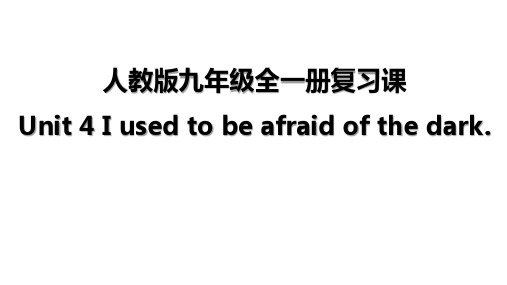
exactly adv. 确切地;精确地 pride n. 自豪;骄傲 proud adj. 自豪的;骄傲的
general adj. 总的;普遍的;常规的 n.将军 introduction n. 介绍
Phrases
10. in front of 在……的前面 辨析:in front of 与 in the front of in front of 在……前面,强调在范围之外的前面。 in the front of 在……的前部,强调在范围之内的前面。
11. whole :形容词,意为“整个的;全部的”。 常用结构:the+ whole +单数名词 辨析:all与whole all用于冠词、所有格或其他限定词之前。 whole用于冠词、所有格及其他限定词之后。
过去常常做某事 害怕 时常;有时 从事;开始 在……前面 能够
used to do sth. be afraid of from time to time take up in front of… be able to
应付;处理 一直;总是 小心;注意 闲逛 不再…… 放弃
deal with all the time be careful about hang out not... anymore give up
2. 与time有关的短语 on time 准时 all the time 总是 at one time 曾经,一度 at no time 绝不
in time 及时 ahead of time 提前 at any time 随时 in no time 立刻;马上
3. score n. 得分;进球
九年级上册英语第4单元作文自己的改变
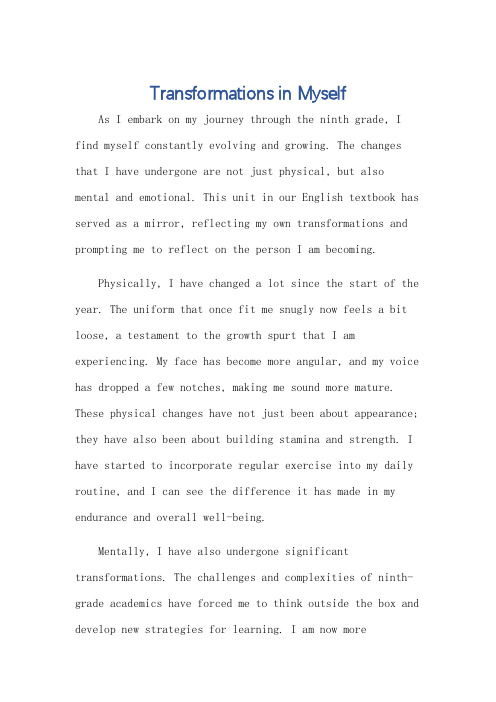
Transformations in MyselfAs I embark on my journey through the ninth grade, I find myself constantly evolving and growing. The changes that I have undergone are not just physical, but also mental and emotional. This unit in our English textbook has served as a mirror, reflecting my own transformations and prompting me to reflect on the person I am becoming.Physically, I have changed a lot since the start of the year. The uniform that once fit me snugly now feels a bit loose, a testament to the growth spurt that I am experiencing. My face has become more angular, and my voice has dropped a few notches, making me sound more mature. These physical changes have not just been about appearance; they have also been about building stamina and strength. I have started to incorporate regular exercise into my daily routine, and I can see the difference it has made in my endurance and overall well-being.Mentally, I have also undergone significant transformations. The challenges and complexities of ninth-grade academics have forced me to think outside the box and develop new strategies for learning. I am now moredisciplined about my studies, setting aside regular hoursfor revision and homework. I have also learned to manage my time more effectively, balancing学术学习, extracurricular activities, and socializing with friends.Emotionally, I have become more resilient and less reactive. I have learned to control my impulses and not let my emotions get the better of me. This has beenparticularly helpful when dealing with peer pressure andthe stress of exams. Instead of succumbing to anxiety or frustration, I now take a step back, breathe deeply, and approach problems with a calm and rational mindset.In addition to these personal transformations, I have also witnessed changes in my relationships with others. I have become more empathetic and understanding towards my classmates, recognizing that we all have our own unique strengths and challenges. I am now more willing to lend a helping hand or offer advice when needed, and this has deepened the bonds of friendship and trust within our group. The changes that I have experienced this year have not been easy, but they have been necessary for my growth and development. I am grateful for the opportunities that havecome my way and the support that I have received from my teachers, parents, and friends. As I look ahead to the rest of the year, I am excited about the further transformations that lie ahead and the person I will become as a result.**我的转变**在我踏上九年级之旅的过程中,我发现自己正在不断发展和成长。
最新人教版九年级英语unit4英文版说课稿

Unit 4 What would you do?Good morning, ladies and gentlemen, nice to meet you here! I amZou Yanni from Qili Middle School, It’s my great honor to stand hereto share my teaching ideas with you. Today I am going to talk aboutthe first period in Section A of Unit 4 What would you do?which is taken from Go for it, Book 5.My presentation consists of six parts: analysis of the teaching material, teaching methods, guide of studying ways, teaching procedures and teaching reflections.I. Analysis of the teaching materiali)Status and functionThe topic of this unit is about imaginary situations. Such a topic enables Ss to activate their imagination and raises their learning interests. The first period serves as an introduction and a lead-in part. The topic “What would you do if you had lots of money?” makes the introduction easier.ii) Teaching aims and demands1. Knowledge ObjectsIn this lesson, Ss should master the new word “million ,medical and research”. At the same time, they should know how to use the target language: Look. This girl won a million dollars in the lottery.Wow! What would you do if you won a million dollars?I’d give it to medical research.And the structure: I would/I’d do2. Ability ObjectsIn this lesson, I’ll mainly train th e Ss listening and speaking abilities and develop the Ss’ abilities of communication by learning the useful structures.3. Moral ObjectsIf you won a million dol lars, you’d buy a big house, buy a car and so forth. However do remember it’s really being cool to realize your dream through great efforts.4.Teaching keys and difficultiesTeaching Key Points1. Target language2. The structure: I would/I’d doTeaching Difficult PointThe structure: I would/I’d do5.Teaching aidsA tape recorder and a computer .II.Analysis of the studentsThe Ss have learned English for two and a half years, they can express their thought and communicate with each other with English well. And all the Ss will be interested in the topic, which is related to their real life.. It’s helpful for our study of this lesson.III.Teaching methodsIn this lesson, I’ll mainly use the following teaching method:1. Scene teaching Method2. Teaching by induction3. PairworkIV.Guide of studying waysIn order to guide the Ss better, develop the Ss’ abilities, in this lesson, the Ss will learn how to be a good language learner, and how to communicatewith others. It will be very helpful for their learning in the future.I think good studying ways can help the Ss to be good language learners.V.Teaching proceduresStep1. RevisionReview the structure "should be allowed to" by asking students to make sentences about school rules.Purpose of my designing: I think it is important to review the knowledge we have learned.Step 2 PresentationRead the instructions to the class.Call students’ attention to the words in the box. Ask a stud ent to read them to the class.Say, What would you do if you had a lot of money? Add more ideas to the list.Then share your answers with other students.Get students to complete the task. First individually, then in groups.As they work, walk around the room checking progress and offering any help they may need.Collect answers from students on the blackboard.Answers will vary but should include a mixture of ideas for helping themselves and others.Purpose of my designing: This activity focuses on vocabulary and structures introduced in this unit.Step3 Listening practiceRead the instructions to the class.Read the question in the speech bubble.Explain the word lottery to students.Say, You will hear teenagers talking about what they would do if they won the lottery. Point to the pictures. Ask students to describe them one by one.For example, for Picture One, a student might say, "If I won the lottery, I’d buy a big house."Point out the sample answer. Say, The first picture you will hear about has the number one on it.Play the recording for the first time.Students only listen.Play the recording again. This time students listen and number the pictures in the order they hear them.Check the answers.(Answers:2,1,4,3)Purpose of my designing: It gives Ss practice in understanding the target language in spoken conversations.Step4. Pairwork 1cRead the instructions to the class.Call students’ attention to the conversation in the box. Explain the vocabulary words million and medical research. Invite a pair of students to read it to the class.S A : Look! This girl won a million dollars in the lottery.S B: Wow ! What would you do if you won a million dollars?S A: I’d give it to medical research.Write it on the blackboard.Say, Pretend you are the people in the picture. Talk with your partner about what you would do if you won a million dollars.Get students to work in pairs. As they work in pairs together, walk around the room offering language support as needed.After students have had a chance to practice several exchanges, ask pairs to come to the front of the classroom and act out their conversations.Purpose of my designing: Task-based teaching method is used here to develop Ss’ ability of communication and also their ability of co-operation will be well trained.Step6. SummaryIn th is class, we’ve learned some vocabulary words and the target language what would you do if you won the lottery? I’d give it to medical research.Purpose of my designing: At the end of the class, we should help the Ss to summarize what we have learned in this lesson.Step7.HomeworkIf you had a large amount of money, e, g. ¥100,000 what would you buy? Please write down each item and its cost to see when you will spend the full amount. And bring your lists to class tomorrow.Purpose of my designing: It is necessary for the Ss to do some extensive exercises after class to consolidate the knowledge they learned.Blackboard designUnit 4 What would you do?Section A The First PeriodA: Look. This girl won a million dollars in the lottery.B: Wow! What would you do if you won a million dollars?A: I’d give it to medica l research.VI. Teaching reflectionThere are three new words in this lesson: million, medical and research.During my preparation, I prepared a lot of pictures to realize the revision and teaching of the new words. I found that they were quite attractive when students saw them during the teaching. In terms of my organization of the class, there were five steps in detail. They were revision, presentation, listening, pairwork and summary. Revision occupied about 6 minutes; presentation occupied 9 minutes; pairwork accounted for half of the class; listening lasted about 6 minutes. I was quite satisfied with the part of oral practice, because every student participated in listening and talking. They could give correct answers when they stood up. The feedback information was ideal at this point. Meanwhile, I was not satisfied with the listening part. If I had five more minutes, I would play the tape recorder for another time and let them repeat what they heard.Because of the limited time, I just let them listen and check the answers, I think it’s not enough if I want to develop their listening and speaking abilities.That’s all about my class. Thank you for listening.。
英语九年级人教版 Unit 4 I used to be afraid of the dark.教案

英语九年级人教版Unit 4 I used to be afraid of the dark.教案Step1: Revision and warning up (1min)Greet the class as usual.Have the students to know the learning objectives of this class:Step2: Practice a sentence: “When I was a child, I used to …”according to some photos of the students.Step3: Let students page29 and look at 1a.There are four pictures. And what can you see from the pictures?What are they? When you were a child, what did you use to like? Check them.1a Check (✔) the things you used to like when you were a child.✔_____music class _____P .E. class _____painting pictures _____ants and other insects ✔✔✔step4. 1b. Group work.Watch a short video and let two students make conversations like that. Step5. 1c: Listen and check the sentences you hear.1d:Listen again, what do the girl and the boy say about things in the past and now? Fill in the chart.Step6: 1e: pair-work.. Compare yourself with your partner and makeconversations.1e Pair -workCompare yourself with your partner.A:I used to be nervous about testsall the time. What about you?B: Y es, me too. And I used to …Step6: Exercise:Step7: Homework:Step8: Summary:Today, we have learnt how to talk about what someone used t o like. Wemastered the target language “I used to do sth” and “I didn’t use to dosth”“Did I use to do sth”“What did you use to like when you were achild” and so on. And we also learnt some new words.六.Blackboard Design.Unit4. I used to be afraid of the dark.Section B 1a-1e Ant; insectI used to like…I didn’t use to like…Did I use to like… Yes, I did./No, I didn’t.What did you use to like…?。
- 1、下载文档前请自行甄别文档内容的完整性,平台不提供额外的编辑、内容补充、找答案等附加服务。
- 2、"仅部分预览"的文档,不可在线预览部分如存在完整性等问题,可反馈申请退款(可完整预览的文档不适用该条件!)。
- 3、如文档侵犯您的权益,请联系客服反馈,我们会尽快为您处理(人工客服工作时间:9:00-18:30)。
20. have experience doing sth 在做某事有经验 如:
I have experience teaching Chinese. 我在教英语方面有经验。
21. come out 出版,出来
The magazine comes out once a week. 这种杂志每周出一次。
If she comes home early, we will visit her together.
▲⑶if 引导的虚拟语气。
即:If从句:一般过去时 主句:would/could/might+ V.原形 如:1、如果我是一个有钱人,我就买很多的车。 If I were a rich man, I would buy many cars. 2、如果我有很多钱, 我就给我的妈妈。 If I had much money, I would give it to my mother.
1.share…with sb 和某人分享 2.put it in the bank 把它存进银行 3.give it to charity 把他给慈善机构 4.medical research 医学研究 5.give advice on… 提有关…的建议 6.what if… 如果…怎么办呢? 7.everyone else 别的每一个人 8.take a big exam 参加一次大的考试 9.help with this problem 帮助解决这个问题 10.take a long walk 长时间散步 11.in public 在公众场合 12.do a survey 做性格调查 13.give /make a speech 作演讲
3. 系动词与形容词连用 get nervous 变得紧张
feel shy 觉得害羞 look friendly 看起来友好
4.too +形/副+to do sth. 太…而不能 如: Eg: I’m too tired to stand. 我太累了而不能站。
5.help with sth. 如:They help with this problem. help sb. do. 如:They help you relax. 他们帮助你放松 6. in public 在公共场所 如:
Unit4 What would you do? (Review)
1. if 引导的非真实性条件状语从句
即 虚拟语气
虚拟语气 :表示说话人所说的话不是事实或是不可能发生的情况, 而是一种愿望,建议或是与事实相反的假设等。 If 引导的条件状语从句分为真实和非真实条件句,非真实 条件句应用虚拟语气。如果要表示与现在或将来事实相反时,其虚 拟语气结构为: 句 型 if条件从句 动词过去式(be动词用were) 主 句
34.on the nearby shelf .在附近的书架上 35.have a lot of experience dealing with teenagers 多关于处理青少年问题的经验 36.have experience in sth.在某方面有经验 e out 出版 38.by accident /by chance 偶然 39.cover sth. With sth. 用…把…盖住 40.be covered with … 被…覆盖 41.fall downstairs 摔下楼梯 42.hurry to do sth 急忙去做某事 hurry up= in a hurry 匆忙 43.medical help . 医学救助 44.find out 查明,找出
处得好吗?
15. would rather do sth. than do sth. 表示愿做某事而 不愿做某事 如: I would rather walk than run. 18. let sb. down 让某人失望 Don’t let your mother down. 不要让你的妈妈失望。 19. come up with sth. 提出 想出 如:He came up with a good idea. 他提出了一个好主意。 catch up with sb. 追上 赶上 如: Lily caught up with Anna. 莉莉赶上了安娜。
6、如果我有长头发, 我会非常的开心。 If I had long hair, I would be very happy. 7、如果我是第一名, 妈妈将对我感到自豪。 If I won the first place, My mom would be proud of me. .
“if” 的考点
8.borrow sth. from sb. 从某人那里借来某物 如: lend sb.sth=lend sth. to sb. return=give back 9.wait for sb.等某人 (wait for sb. to do sth) 10.invite sb. to do 邀请某人做某事 如: Lily invited me to go to her home for supper. 11. have dinner/ supper 吃晚饭 have lunch/ breakfast 吃午餐、吃早餐 12. plenty of 修饰不可数名词,也可以修饰可数名词 许多 如:
Don’t smoke in public. 请不要在公共场所吸烟
7.energetic adj. 活力的 如:She is a energetic girl. energy n. 活力 如:She has lots of energies. 8. ask sb. to do 叫…做某事 ask sb. not to do sth.叫…不要做某事 tell sb. to do 告诉…做某事 tell sb. not to do sth. 告诉…不要做某事 如:Teacher asked me to clean the classroom. Teacher asked me not to clean the classroom
▲⑴在一个句子中,if引导宾语从句“是否”。 (该用什么时态就用什么时态) 如:1、我不知道明天是否会下雨。 I don’t know if it will rain tomorrow. 2、 我不知道他昨天是否迟到了。 I don’t know if he was late yesterday.
▲⑵if 引导条件状语从句,“主将从现” 即:主句:将来时 if 从句:一般现在时 如:1、如果明天下雨, 我就呆在家。 If it rains tomorrow, I will stay at home. 2、 如果她回家早, 我们就一起拜访她。
They have plenty of food/ apples. 他们有许多的食物/苹果。
13.give sth. to sb. =give sb. sth.
14. get along with sb. 与…相处 如: Do you get along well with your friends? 你和你的朋友相
45.put the burned area under cold running water 把烧伤部位放在凉的流动的水下冲。 46.get along (well) with…/get on (well) with… 与某人相处 47.plenty of … 很多的,足够的 48.in history 历史上 49.hide sth. from sb. 隐藏某物不要某人看见 50.ask sb.for advice 向某人寻求意见 51.be late for 迟到 I am late for work/ school/ class/ party.
would+动词原形
即:(从句)if +主语+动词过去式(be 动词用were),
Hale Waihona Puke (主句) 主语+would+动词原形
例子:
1、如果我是你,我每天都吃巧克力。 If I were you, I would eat ice cream every day. 2、如果我是一只小鸟,我就可以在天空飞翔。 If I were a bird, I would fly in the sky. 3、如果他学习再努力一点, 他就会通过考 试了。 If he studied harder, he would pass the test. 4、如果我有100万,我就给你一辆车。 If I had one million, I would give you a car.
22. by accident 偶然地,无意之中 如:
中考真题:
1.(2006)If you don’t go to the meeting tomorrow,______. A. he will,too B. he won’t, either C. he does, too. D. he doesn’t either 2.---The TV show Home with kids is so wonderful. You shouldn’t miss it. --- If I have time, I ____ it.(2007) A. see B. saw C. will see D. have seen 3.(2010)If you ___ to the 2010 Shanghai Expo next month, I will go with you. A. go B. has gone C. will go D. are going 4.(2008)I’m waiting for my friend, _______, I will go shopping alone. A. If she come B. If she will come C. If she doesn’t come D. If she didn’t come.
